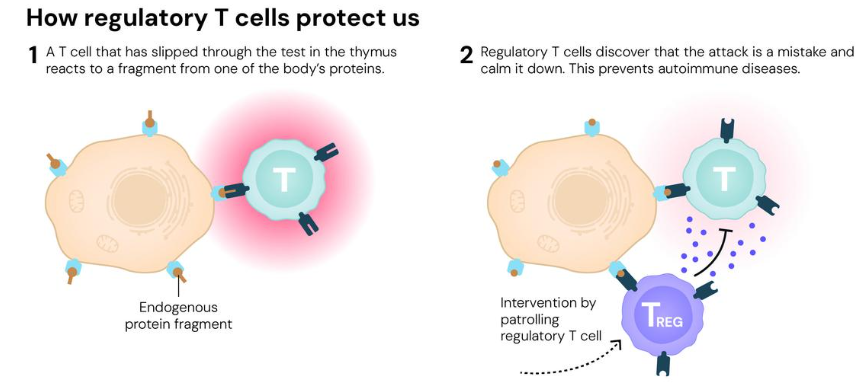



The 2025 Nobel Prize in Medicine was awarded for discovering regulatory T cells, immune cells that maintain tolerance and prevent autoimmune diseases. These cells balance immune responses but can sometimes hinder anti-cancer activity.

Copyright infringement not intended
Picture Courtesy: The Hindu
The 2025 Nobel Prize in Physiology or Medicine was awarded to Mary E. Brunkow, Fred Ramsdell, and Shimon Sakaguchi for their pioneering work on peripheral immune tolerance and regulatory T cells.
Regulatory T cells (Tregs) are an important group of T cells responsible for controlling the immune system’s activity to ensure it does not attack the body’s own tissues, thereby preventing autoimmune diseases and allergic reactions. They perform this function by releasing anti-inflammatory substances and employing various suppressive methods. However, their immune-suppressing role can sometimes hinder the body’s ability to fight tumours. Tregs are characterized by the expression of the transcription factor FoxP3 and specific surface markers such as high levels of CD25 and low levels of CD127.

Regulatory T cells are essential guardians of the immune system, maintaining balance by preventing autoimmune diseases, controlling inflammation, and modulating allergic reactions. While their suppressive function can sometimes hinder anti-cancer responses, Tregs play a critical role in transplant tolerance and overall immune homeostasis.
Source: The Hindu
|
Practice Question Q. The Nobel Prize in Medicine 2025 was awarded for discoveries related to immune tolerance. Elaborate on the key findings and their importance for understanding autoimmune diseases. |
It was awarded to researchers who discovered the function of peripheral immune tolerance through Regulatory T cells, advancing our understanding of autoimmune diseases.
Regulatory T cells are a specialized subset of immune cells that help maintain immune balance by preventing the immune system from attacking the body’s own tissues, thereby avoiding autoimmune diseases.







© 2026 iasgyan. All right reserved